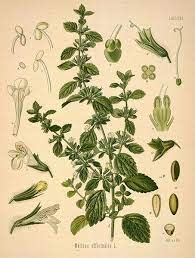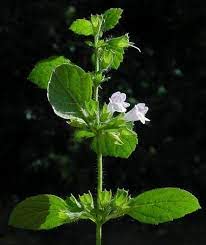Melissa (Melissa officinalis), or lemon balm as it is commonly known, has been a favourite plant with healers since the days of the ancient Greeks. It is a member of the Labiateae family, a botanical group which contains hundreds of plants, used by herbal practitioners and aromatherapists for their therapeutic properties.

Loved by bees, the plant is thought to have been named after the ancient Greek nymph Melissa, protectress of the bees.
Melissa is a vigorous plant, growing up to 70cm, with bright green leaves and small pinkish-white flowers. The fresh leaves, picked before the plant comes into flower, may be used to make a refreshing lemon tea in summer, or a compress to relieve painful swelling.
Native to the Mediterranean region and parts of Asia, melissa is now widely grown throughout Europe, having been introduced north of the Alps during the middle ages when it was cultivated in monastery gardens. Melissa is commercially cultivated in France, Germany, Spain and Russia, although some is harvested as a herb rather than being distilled for essential oil. Small quantities of melissa essential oil are also produced in Ireland and Sicily. Various forms of melissa are extensively used by the fragrance and flavouring industries; the herb is a traditional ingredient of certain liqueurs, including Chartreuse.
The essential oil is extracted by steam distillation of the leaves and flowering tops of the plant in early to mid-summer. The essential oil is a pale yellow liquid with a fresh lemony aroma touched with honey and characterised as a top note.
True or False Melissa?
The major problem with essential oil production of melissa is that it has a very low yield. Although a powerful lemon fragrance can be smelled just by rubbing a leaf between the fingers, the percentage of oil extracted by distillation can be as low as 0.01%. Some distillers who supply essential oils for therapeutic use, rather than perfumery or flavouring, counteract this problem by distilling melissa with a high-yield plant with similar properties. Inevitably, the low yield of melissa results in the pure essential oil being extremely scarce, and demand always outruns supply.

To meet the demand, some suppliers offer a melissa-type oil, which is usually a blend of lemon, lemongrass, citronella an sometimes synthetic citrus terpenes. This is significantly cheaper but may contain no melissa at all and is unlikely to have the same therapeutic properties.
This product should be viewed only as a perfume or room fragrance.
Properties of Melissa
Research has demonstrated that melissa has a strong sedative action and that smaller doses are more effective in this respect. Melissa is one of the essential oils that is also widely recommended for its uplifting effects on the mind and emotions.
Therapists working with the terminally ill or bereaved have remarked on melissa's comforting effects at times of sadness, trauma or hysteria. It is also helpful for extreme nervous tension or breakdown, an for menopausal emotional symptoms. In all these events, insomnia can become a major problem. Nervous tension may also affect the digestive system and increase blood pressure, both of which melissa is effective in treating.
Although melissa is often used for its effects on the mind, emotions and spirit, the oil does have other important properties. Research has shown that the essential oil has a powerful effect on the secretions of the gall bladder and stomach, and so can be very effective in soothing stomach cramps and indigestion, and relieving nausea.
Studies have also shown that melissa is very effective in the treatment of cold sores and shingles. Pure essential oil of melissa can be blended with rose otto and the undiluted blend applied directly to the blisters, care being taken to avoid the surrounding skin and minimise irritation. This treatment can have rapid result but should be used only on adults, and not for any condition requiring medical attention.
Although melissa has the image of being a gentle oil, it is extremely potent and should be used with caution. Never exceed a 1% dilution and avoid on skin which is hypersensitive or damaged. Melissa is unsuitable for children under the age of two.